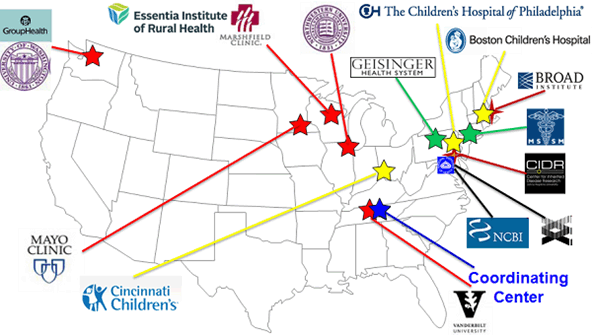Collaborations
eMERGE (electronic Medical Record-Genome) Network

BioVU served as a platform for Vanderbilt’s successful application to join NHGRI’s eMERGE (Electronic Medical Records and Genetics) Network. Vanderbilt is one of 9 sites in the network that link electronic medical records with genetic information to perform a series of studies examining the association between genetics and phenotypes extracted from the electronic medical record. More than a dozen phenotypes are currently being investigated within the eMERGE Network. Ethical, legal social and policy issues are also a focus of the eMERGE Network.
PAGE (Population Architecture using Genomics and Epidemiology) Consortium

Genome-wide association studies have identified many genetic variants related to disease and have highlighted the need to further explore initial findings in non-European populations. The Population Architecture using Genomics and Epidemiology (PAGE) Consortium was formed in July 2008. PAGE aims to examine putative causal genetic variants across approximately 100,000 African Americans, Asian Americans, American Indians, European Americans, Hispanic Americans, and Native Hawaiians from 4 groups representing 9 large U.S.-based cohorts. By coordinating genotyping and phenotype harmonization across groups, PAGE is defining the epidemiological architecture of cross-population allele frequencies, relative risks, and distribution of phenotypes associated with particular genetic variants and their environmental modifiers.
IMSGC (International Multiple Sclerosis Genetics Consortium)
The IMSGC (International Multiple Sclerosis Genetics Consortium) was established in 2003 and is focused on collaboratively finding genetic association with MS and MS-related diseases. Over 30 institutes in more than 15 countries participate in the consortium. In 2007 the consortium performed a genome-wide association study in over 12,000 subjects and found 17 single nucleotide polymorphisms (SNPs) associated with MS. This study demonstrated the strength of the whole genome association study design and collaboration among the consortium.
IIBDGC (International Inflammatory Bowel Disease Genetics Consortium)
The International IBD Genetics Consortium is a network of researchers working on the genetics of inflammatory bowel disease (IBD). Researchers in more than 10 countries are collaborating to study over 40,000 individuals with IBD. The IIBDGC has undertaken a number of large scale genome-wide association studies of both Crohn’s disease and ulcerative colitis, which have identified dozens of genomic loci implicated in these diseases (99 at the end of 2010). The goal of this research is to translate these discoveries into a more complete understanding of the biology of IBD which might lead to improved diagnoses and treatment.
COGENT (Continental Origins of Genetic Epidemiology Network)
This is an ongoing investigation of the genetic factors of blood pressure (BP) in recent African ancestry populations. We have analyzed genome-wide genotyping data from ~30,000 African ancestry participants, with additional replication in African (~4,000), European (~70,000), and East Asian (~20,000) samples. We discovered three new genetic factors that influence BP and refined a previously linked genetic association. Our results demonstrate the utility of exploring demographically distinct populations for novel associations and that most of the genetic determinants of BP likely pre-date the out of Africa migrations early in the history of modern humans.
African American BMI GWAS Consortium
This ongoing project is focused on discovering the genetic factors that influence body mass index (BMI) in populations of recent African ancestry. We have analyzed genome-wide genotyping data in ~40,000 African ancestry participants, with additional replication analysis in over 10,000 additional participants. Three new BMI-associated genes were identified through these studies. Most of the genetic determinants of BMI likely pre-date the out of Africa migrations early in the history of modern humans.
Osteoporotic Bone Fracture Consortium of African Ancestry Populations
This consortium is studying the genetic determinants of osteoporotic bone fractures in recent African ancestry populations. Osteoporosis is a major public health problem associated with excess disability and mortality. This study leverages genome-wide association study (GWAS) data from several cohorts to identify genetic determinants of fracture among African Americans. Data on incident fractures, except fingers, toes, face, skull or sternum, were analyzed in unrelated African American participants in the Women’s Health Initiative, Cardiovascular Health Study, BioVU, and Health ABC. These data are currently being analyzed.